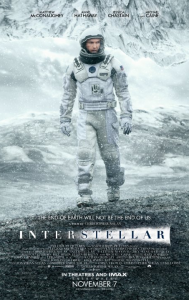
 “Interstellar” wants to be an intelligent look at weighty issues. But it also wants to be an endearing escape that abandons concrete notions of space travel in favor of theoretical physics. Ultimately, its reach exceeds its grasp, but that’s not necessarily a bad thing. Aspiring astronaut and engineer Cooper (played by Matthew McConaughey) never got to leave Earth.
“Interstellar” wants to be an intelligent look at weighty issues. But it also wants to be an endearing escape that abandons concrete notions of space travel in favor of theoretical physics. Ultimately, its reach exceeds its grasp, but that’s not necessarily a bad thing. Aspiring astronaut and engineer Cooper (played by Matthew McConaughey) never got to leave Earth.
When crops became impossible to grow and a creeping blight infected everything, government priorities shifted from looking upward to focusing on more grounded concerns. Cooper now repairs farm equipment and grows corn with his father-in-law and two kids. Cooper’s wife has passed on, leaving him a single father wanting for some greater meaning in his life. After having a run-in with teachers at his daughter’s school over whether we ever went to the moon, Cooper realizes merely existing on this planet might not be enough.
Enter Professor Brand (Michael Caine), a theoretical physicist who, with a team of scientists, has discovered a wormhole near Saturn that may offer hope for humanity. Brand turns to Cooper to pilot the mission into the wormhole. Along with him, he sends a team which also includes his scientist daughter (Anne Hathaway). But will they find what they are looking for? And can Cooper make his way home to his heartbroken daughter, who begs him not to take the mission?
Introducing the problems on Earth is interesting but will try the audience’s patience as the first-third of the film unfolds like some kind of drama set on a family farm. The ominous sci-fi elements are reminiscent of M. Night Shyamalan’s “Signs.” While I was fascinated by the decaying world established by director Christopher Nolan, who works from a script he co-wrote with his brother Jonathan, I wanted a bit more context. Clearly, the world is slipping into some kind of “Grapes of Wrath” dustbowl, but the focus is so tight, we get little understanding of the scale of it. Sure, there are cryptic comments about what happened, like the off-handed suggestion the Earth’s population has either shrunk or exploded – it is all a bit too ambiguous and, frankly, perplexing. Combine this confusion with casting not ethnically diverse enough, featuring faces so familiar it is hard to immediately buy them in their roles.
This is one film that could have benefited from casting more unknown actors, because even though McConaughey, Hathaway and Caine are mighty fine delivering their lines, I couldn’t erase the fact I’ve seen them so many times in the past. I was reminded by what David Gordon Green did with his film “Joe,” in matching Nicolas Cage with little known or untrained actors. It doesn’t help the “Interstellar” casting is a bit monochromatic, with all the key characters speaking only English and appearing to hail exclusively from the American Midwest (sure, Caine speaks with his English accent, but the film could have used a bit more diversity). I kept wondering why the last great hope for humanity is left to this particular group? More context may have sold the narrative choices better.
And the initial first-third of the film has odd tone problems. While the world is literally turning to dust, McConaughey’s Cooper spends time sitting on his creaky front porch drinking beer. So, somewhere, someone is still bottling up the tasty alcoholic beverage, wasting hops on malt refreshments. I just couldn’t wrap my head completely around this. It smacked of an opportunity to put a beer bottle in McConaughey’s hand so he can wax philosophically as the rugged individualist we have come to know and love.
Time is also a frustrating part of the narrative. As the action shifts to the wormhole, we are schooled on how many years are lost back home. Cooper’s kids grow up and send messages to dear old Dad that are received in the spaceship. Conveniently, no messages can be sent back, which acts to deepen the mystery a bit. What is supposed to be heart-wrenching proves to be frustrating.
But “Interstellar” is hardly a bad film. The drama may be thick and in places, the score by Hans Zimmer overwhelms by suggesting exactly how we should feel. But everyone is so committed that it will connect to some viewers powerfully. Still, many of you will likely find the dramatic portions of the story weak and emotionally cold. Humor is inserted by a pair of clever robots who ultimately become one of the film’s delights. The way they move and react to situations are seamless bringing these boxy metal creations really alive on-screen. And the planets the team visits on the other side of the wormhole are both breathtaking and exciting. The environments are unique and provide thrilling moments. One sequence is as good as anything from last year’s “Gravity,” which will no doubt be invoked as an effort to ensnare viewers. Just how audiences will react to the conclusion of “Interstellar” remains to be seen. So much of the film relies on concrete science that the sudden shift to the theoretical may be a bit jarring.
Still, “Interstellar” tries and largely succeeds in commenting on issues with a lot of gravity. It is a unique film, to be sure, and one probably best experienced on the largest screen available. But I was left thinking time waits for no man, unless you have a wormhole at your disposal.
EDITOR’S NOTE: This review first appeared in print and online in the Times Herald.
